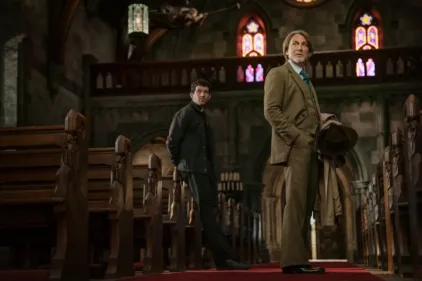LONDON – There’s a photograph of Irene Papas in the files of The Sun-Times, taken when she arrived in Hollywood in the 1950s. It’s a typical publicity picture, sort of modified cheesecake; she’s sitting on a trunk with her legs crossed and the handout says something about a Greek starlet arriving to star in the new Cagney picture.
Movie publicity is routinely irrelevant, but this photo is some sort of prizewinner. To imagine Irene Papas ever being described as a “starlet” is wild
enough; to imagine her as a subject for cheesecake is to define, somehow, what desperate lengths Hollywood went to in the TV-dominated 1950s. Or to put it
another way: There are a lot of pretty girls in movies, but not many women. Irene Papas is a woman, a lady, a great actress. We do not have many like her. Perhaps that’s why she doesn’t appear in many movies; ordinary actors have trouble sharing the screen with her. John Wayne has something of the same quality. Many young actors don’t have the authority and presence to play opposite him. They tend to go
transparent.
Miss Papas has other problems: Her height rules out many leading men, her accent rules out many roles, and her unusual beauty is not the sort that superstar
actresses like to compete with. Still, she’s been in enough movies to inspire something of a cult. She was the widow in “Zorba the Greek,” and the guerrilla
fighter in “The Guns of Navarone,” and she triumphed in two classical leading roles, “Electra” and “Antigone.” Most recently she was Kirk Douglas‘ wife in “The Brotherhood,” and now she is playing Katherine, wife of Henry VIII, opposite Richard Burton in “Anne of the thousand Days.”
She had just arrived for costume fittings one day last week, and she visited the set to watch Burton and Genevieve Bujold (as Anne) do the scene in which he agrees to murder Katherine.
“Not very encouraging, is it?” she said. “But I prefer Anne to Katherine all the same. Katherine already had 20 years of Henry. Why not let another woman have a chance?” She smiled. “But don’t quote me because the English adore their suffering Queen Katherine.”
She watched Burton for a moment. “You know,” she said, “I once auditioned for a part opposite him in ‘Alexander the Great.’ But I didn’t get it. I never do, when I audition. I don’t like the thought that I’m being judged.
She greeted Burton and Miss Bujold; was introduced to Charles Jarrott, the young Canadian director; said hello to Liza Todd, Elizabeth Taylor’s daughter, who was visiting the set, and then it was time for lunch in the Shepperton Studios commissary. She ordered a plate of salmon and a bottle of mineral water:
“Something simple. My stomach has been a bit uneasy today.”
She lives entirely in hotels these days, she said. Like Melina Mercouri, she refuses to return to Greece until the military junta is overthrown.
“We are nothing but an American colony,” she said. “We import chewing gum and automobiles, books and records and culture. No wonder the Americans have done nothing against the junta. They run the country. What’s Onassis? Nothing.
“And yet who am I to talk? I make movies, and where does the money come from for them? Sometimes I think I should simply stop acting. A person should change
professions every so often. I keep repeating my same skills in film after film. My mind is so deep in laughter and tears.
“Why do anything, for that matter? The more mature you become, the less you want to teach. And acting is teaching. I claim that I act because I need to eat. I cry and I eat. But why should I eat simply because I cry well? I should eat because I am hungry. But that is so difficult in this world.
“We live surrounded by consumer goods, by artifacts. In the cities, we are victims of the amount of merchandise that needs to be transferred. After they discovered the washing machine, everyone should have been given one. Otherwise, what is the benefit of progress? To make money?
“Plato made the first mistake. He began to talk about the soul and morality, and he prevented the Epicureans from searching the nature of man. So Plato delayed the scientific and technical revolution for 3,000 years…”
Just then Hayley Mills came into the dining room. Miss Papas greeted her warmly. “I was in a picture with her, ‘The Moon Spinners.’ You don’t remember? Ah,
well, I do many bit parts: I’m not too proud, and they pay well.
She spoke of “A Dream of Kings.” the film based on Harry Mark Petrakis’ novel about the Chicago Greek community, in which she plays opposite Anthony Quinn. “I don’t think Mr. Petrakis will like my performance,” she said. “I’ve heard that he wanted me for the role, but I don’t know if he’ll like what I did. The movie was quite changed from the book. But perhaps that was for the best: sometimes you cannot make a movie faithfully from a book. You can only be true to the book by changing it…
“As for myself, I simply followed the instructions of the director. To play the scene the way I want to, I would have to be the director myself. But if I am not the director, then I follow the director. How else? “That is why I sometimes think I will forget acting, and do something that involves more of myself. I write poetry sometimes; in fact, I had a poem published not long ago in the Saturday Review. But usually I write poems just for myself when I am in difficulty, They are like a tear.”
She finished her lunch, ordered an orange for dessert, and peeled it with her fingers: “Like in Morocco. I enjoyed visiting there so much, because they’re so civilized about eating. They simply wash their hands and use them to eat with. They have big pots, and you dip in, and they have pies made from meat, almonds and sugar…delightful.”
It was nearly time for her to get on with the costume fittings. “And so I will go off and play the beloved queen,” she said. “Did you see that film, ‘I Am Curious (Yellow)?’ No? I saw it, and I rather liked it.
Everyone was so excited, but for the wrong reasons. What I liked was that the sex is a real part of the film, and not something pornographic that was just clumsily added.
“And the girl in the film, the actress. She was very natural. She had a belly, her figure wasn’t so good, but she couldn’t care less. And so we know when we see this film that not only movie stars make love. Other people make love, too. Everybody makes love…” A messenger came to summon her to the fitting, and she hurried away. A moment later she was back, laughing, picking up something from her chair: “Can you believe it? I was sitting on my script.”











